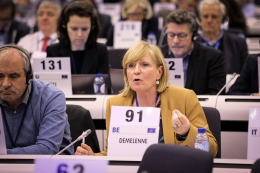European Economic
and Social Committee
Subscribe
Main navigation
-
Základné informácie
ABOUT
The European Economic and Social Committee (EESC) is the voice of organised civil society in Europe.
Find out more about its role and structure at http://www.eesc.europa.eu/en/about
- Politická organizácia
- Administratívne usporiadanie
- SPOLUPRÁCA S INÝMI INŠTITÚCIAMI
- Rules
-
Naša činnosť
OUR WORK
The EESC issues between 160 and 190 opinions and information reports a year.
It also organises several annual initiatives and events with a focus on civil society and citizens’ participation such as the Civil Society Prize, the Civil Society Days, the Your Europe, Your Say youth plenary and the ECI Day.
Find the latest EESC opinions and publications at http://www.eesc.europa.eu/en/our-work/opinions-information-reports/opinions and http://www.eesc.europa.eu/en/our-work/publications-other-work/publications respectively.
- Stanoviská a informačné správy
- Dokumenty
- Publikácie a iná činnosť
-
Občianska spoločnosť a účasť občanov
- European elections 2024
- Civil Society Week 2024
- Cena pre občiansku spoločnosť
- The Conference on the Future of Europe
- Dni občianskej spoločnosti
- Európsky pas demokracie
- Vaša Európa, váš názor
- Európska iniciatíva občanov
- The path to our industrial future
- Youth Climate and Sustainability Round Tables
- EU Organic Awards
- Civil Society Against COVID-19
- EESC stands with Ukraine
- Partnerships
- Relations with ESCs
-
Politika
POLICIES
The EESC is active in a wide range of areas, from social affairs to economy, energy and sustainability.
Learn more about our policy areas and policy highlights at http://www.eesc.europa.eu/en/policies
-
Oblasti politiky
- Poľnohospodárstvo, rozvoj vidieka a rybolov
- Podnebni ukrepi
- Politika súdržnosti a regionálna a mestská politika
- Spotrebitelia
- Digitálne zmeny a informačná spoločnosť
- Hospodárska a menová únia
- Vzdelávanie a odborná príprava
- Zamestnanosť
- Energetika
- Podnikanie
- Životné prostredie
- Vonkajšie vzťahy
- Finančné služby a kapitálové trhy
- Základné práva a práva občanov
- Priemysel a priemyselné zmeny
- Inštitucionálne záležitosti a rozpočet EÚ
- Migrácia a azyl
- Výskum a inovácie
- Služby všeobecného záujmu
- Jednotný trh
- Sociálne veci
- Udržateľný rozvoj
- Zdaňovanie
- Doprava
-
Oblasti politiky
-
Program podujatí
AGENDA
The EESC holds nine plenary sessions per year. It also organises many conferences, public hearings and high-level debates related to its work.
Find out more about our upcoming events at http://www.eesc.europa.eu/en/agenda/our-events/upcoming-events
- Nadchádzajúce podujatia
-
Aktuality a médiá
NEWS & MEDIA
Here you can find news and information about the EESC'swork, including its social media accounts, the EESC Info newsletter, photo galleries and videos.
Read the latest EESC news http://www.eesc.europa.eu/en/news-media/news and press releases http://www.eesc.europa.eu/en/news-media/press-releases
- President
-
Členovia a skupiny
MEMBERS & GROUPS
The EESC brings together representatives from all areas of organised civil society, who give their independent advice on EU policies and legislation. The EESC's326 Members are organised into three groups: Employers, Workers and Various Interests.
Find out more about our Members and groups at http://www.eesc.europa.eu/en/members-groups
- Členovia
- Skupiny
-
Sekcie a iné pracovné orgány
SECTIONS & OTHER BODIES
The EESC has six sections, specialising in concrete topics of relevance to the citizens of the European Union, ranging from social to economic affairs, energy, environment, external relations or the internal market.
Find out more at http://www.eesc.europa.eu/en/sections-other-bodies
-
Sekcie / komisia
- Sekcia pre hospodársku a menovú úniu, hospodársku a sociálnu súdržnosť (ECO)
- Sekcia pre jednotný trh, výrobu a spotrebu (INT)
- Sekcia pre dopravu, energetiku, infraštruktúru a informačnú spoločnosť (TEN)
- Zaposlovanje, socialne zadeve in državljanstvo (SOC)
- Sekcia pre poľnohospodárstvo, rozvoj vidieka a životné prostredie (NAT)
- Sekcia pre vonkajšie vzťahy (REX)
- Poradná komisia pre priemyselné zmeny (CCMI)
- Monitorovacie strediská
- Iné
-
Sekcie / komisia
- Ukraine









